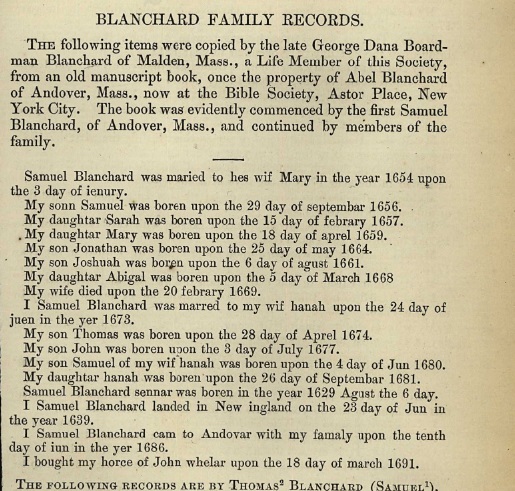Samuel Blanchard and His Beloved Black Horse
My ninth great-grandfather Samuel Blanchard kept what
researchers term a “manuscript book” in which he recorded the significant
events of his life, the sort of record often kept in a family Bible. The
interesting thing about this record of births, deaths and marriages is that he
added an entry about his horse, indicating how important the beast must have
been to him.
Samuel begins his records by recording his marriage to his
first wife Mary on the third day of January in 1654. He then follows with the
names of their six children and the dates of their birth, followed with the sad
notation, “My wife died upon the 20 febrary 1669.”
However, life looks up again. His next entry reads, “I
Samuel Blanchard was marred to my wif Hanah upon the 24 day of Juen in the yer
1673.” Next follows notations of the births of his four children with Hannah.
He then writes down the other significant events of his
life: first, his own birth in 1629. Next, his arrival in America and his
relocation to Andover:
“I Samuel Blanchard landed in New Ingland on the 23 day of
Jun in the year 1639. I Samuel Blanchard cam to Andovar with my family upon the
tenth day of jun in the yer 1686.”
Then follows a truly extraordinary entry:
“I bought my horce of John Whelar upon the 18 day of march
1691.”
The purchase of his horse ranked among the most important
events of his life, alongside his marriages, the births of his children, and
his voyage to a new land.
When he wrote his will on Nov 21, 1704, Samuel divided his
lands, livestock and personal possessions amongst his children and widow, and
finished up with the following bequest:
“Last My black horse I doe give to my Dear Wife”.
This horse must have been incredibly important to Samuel. We
tend to think that colonists nearly lived on horseback, using horses for travel
and as work animals. But early in the Puritan era in New England, there were
few horses. Most farmers used oxen teams for farm work if they had any sort of
work animal at all. By the time of Samuel’s horse purchase, there were large
breeding operations in the colonies, and horses were starting to be exported
rather than imported. Even with their increase in numbers in the 1690s, the
purchase of a horse was probably seen as a sign of wealth and status, the
equivalent of a modern purchase of a luxury car.
Samuel’s pride in his black horse seems obvious, and quite
charming. It is a shame that he never recorded the animal’s name.



No comments:
Post a Comment